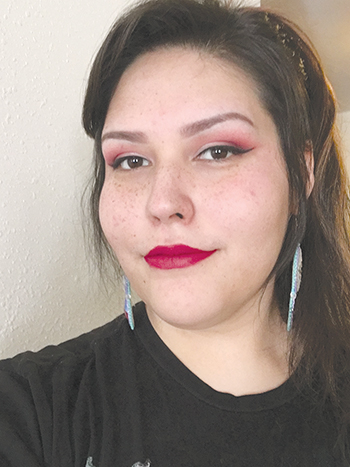As a child, Band member Samantha Peet didn’t hear or speak Ojibwemowin — the Ojibwe language — but she always had a burning desire to learn.
"I grew up hearing tales of my ancestors — Grandpa Jeyaag and Grandma Maanaan — and all the amazing things they could do as healers," said Samantha. "I always wanted to know more about them and know where I came from as an Anishinaabe person."
Wanting to learn isn’t always enough, however. "Even though I had always been interested in learning, I didn’t have the resources or family members who knew the language," she said.
In 2010, after graduating from Minisinaakwaang Leadership Academy in District II, Samantha saw an opening for a teacher trainee with the Band, and she applied.
Finally she had access to books, teachers like Obizaan and Chato Gonzalez, and peers who were also learning the language.
"We’d have language tables, where I was introduced to the picture method — ways you can talk about a picture," Samantha said. "I learned a lot that way."
Samantha also studied on her own, reading bilingual texts and listening to recordings of Elders.
It wasn’t all easy. Study sessions with Obizaan and Chato could be overwhelming as Samantha and the other trainees examined texts that the language masters were working on together.
She also attended ceremonies to hear the language, which was also tough.
"I couldn’t understand a thing they were saying," she said. "I didn’t know what they were doing or why. It was really draining at first, making my mind work overtime."
Ironically, it got easier as she stopped trying so hard. "Pretty soon I learned to just let it go, pick up one word if I could, and save it for next time. When I let off the internal pressure, I started to learn faster and feel more comfortable."
The turning point came when she signed up for the winter cohort at Ojibwemotaadidaa Omaa Gidakiiminaang immersion program hosted by Fond du Lac Tribal and Community College.
"It was so intense — recording elders, making lesson plans, studying with peers, grammar sessions that would go until midnight. None of us wanted to stop!" Samantha recalled.
The following year, Samantha was asked back as a language specialist.
"That’s where I got a lot better, being around it from the time you wake up until you go to bed at night."
As time went on, Samantha found herself thinking in Ojibwe and even imagining that she was hearing Ojibwe in strange places, like shopping at Walmart.
The result was life-changing. "Before I started, I was very closed in. I didn’t open up to people. Having a conversation gave me a lot of anxiety. Learning the language opened me up and gave me confidence that I never had before. It helped me build relationships and learn new things I never thought I’d be doing. I’m such a different person than when I started. I just kind of found out that this is something I need to do for myself and others."
Samantha said she got off her path a few years ago after her father passed away, but now she is ready to get back on track and share her gift. She’s done some teaching with the Niigaan program, and for the last two months, Samantha has been helping prepare the language lessons in Ojibwe Inaajimowin, the Mille Lacs Band’s monthly newsletter.
Samantha’s story shows that anyone who has that same desire to learn can become a speaker if they are willing to put in the time and energy — and if they take advantage of the assistance that’s available.
"All these amazing people came together to help me, and that’s what I want to give back," Samantha said. "People took pity on me, were compassionate with me, and were patient. I want to help show others that they can do it too. We’re all Anishinaabe in our hearts; we just need to unlock it. It’s there for us, and we just need to find it."